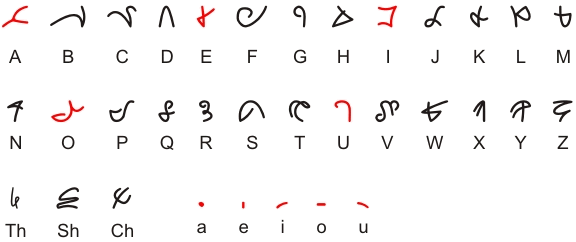The Ishirkian language was first created in 1994 by Chris Payne. It was originally created to be a coded way to write in English between friends. After a few weeks they decided to find a way to actually speak this code. The English alphabet was then jumbled (vowels with vowels, consonants with consonants) to create a "code" that could actually be spoken. This also improved the encrypted text since the glyphs would need to be decoded, then the text would need to be translated.
Over the next few years the creator of the language was very into story writing. While going through some books Chris found a notebook that he used as kind of a "journal" written entirely in this coded language. He was surprised that even years later he could still read it perfectly. He decided to update the glyphs and use it in a story about a highly advanced alien civilization. The story would be written like a documentary from a humans point of view interviewing and learning about the Ishirkian culture. After deciding to make Ishirkian the native language of this advanced alien race, it was decided to completely redesign the writing and the language to be faster and more efficient the way the language of a more advanced race might be. Ishirkians were given a background history, a belief system, technology, culture, and their own system of measuring time and space.
 Vowels are written as accents above the consonant they follow. Double-consonant sounds are indicated by underlining the consonant that is being duplicated. The purpose is to save as much time as possible when writing for faster communication.
Vowels are written as accents above the consonant they follow. Double-consonant sounds are indicated by underlining the consonant that is being duplicated. The purpose is to save as much time as possible when writing for faster communication.

Numbers are written using digits to represent numbers 0 through 9. There are also glyphs to represent the numbers ten, hundred, thousand, million, billion, trillion, quadrillion, quintillion, sextillion, and septillion. These are mainly used when hand writing numbers to make writing very large numbers faster and more efficient. The TEN symbol was originally created for the Ishirkian calendar system. An Ishirkian Year is first divided into ten segments (like months). A ten glyph was created to keep their calendar consistent so there wasn't just one "month" with a two-digit number. When numbering their years they created the hundred and thousand glyph to write the years faster. From there they decided to create glyphs for more larger numbers for future use.





The same text in CAPS

Tanep eksi lewo'oh j'rup xuv'puh'c oh kuvth. Acek op'xifox oh koejip oh yip'jyuop'yo oh fu'eyh hi ipo'oh up'min'go.
All human beings are born free and equal in dignity and rights. They are endowed with
reason and conscience and should act towards one another in a spirit of brotherhood.
(Article 1 of the Universal Declaration of Human Rights)
Constructed scripts for: Ainu | Arabic | Chinese languages | Dutch | English | Hawaiian | Hungarian | Japanese | Korean | Lingala | Malay & Indonesian | Persian | Tagalog / Filipino | Russian | Sanskrit | Spanish | Taino | Turkish | Vietnamese | Welsh | Other natural languages | Colour-based scripts | Tactile scripts | Phonetic/universal scripts | Constructed scripts for constructed languages | Adaptations of existing alphabets | Fictional alphabets | Magical alphabets | A-Z index | How to submit a constructed script
[top]
You can support this site by Buying Me A Coffee, and if you like what you see on this page, you can use the buttons below to share it with people you know.

If you like this site and find it useful, you can support it by making a donation via PayPal or Patreon, or by contributing in other ways. Omniglot is how I make my living.
Note: all links on this site to Amazon.com, Amazon.co.uk
and Amazon.fr
are affiliate links. This means I earn a commission if you click on any of them and buy something. So by clicking on these links you can help to support this site.
[top]